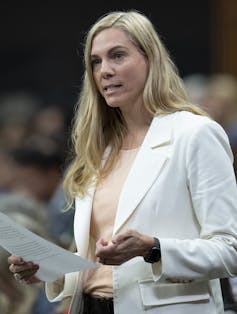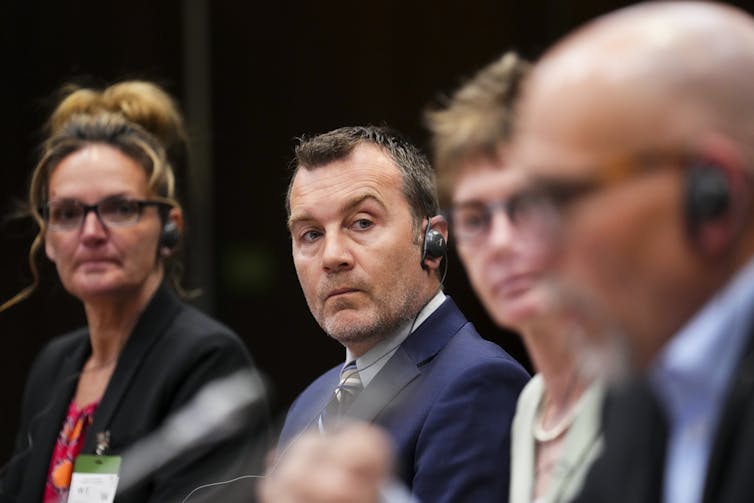Canada has a rich sporting history. It’s part of the country’s fabric. But in recent years, that fabric has been tearing apart.
From hockey to gymnastics and soccer, among others, the news has been littered with reports of abusive behaviour, funding issues, lack of transparency and accountability, boards of directors not fulfilling their fiduciary duties, medal-chasing decision-making, capacity issues and mismanagement of resources.

The new measures recently announced by federal Sport Minister Pascale St-Onge are positive steps. By 2025, all federally-funded national sport organizations will have to adopt the governance principles of the Canadian Sport Governance Code, including having an athlete representative on their board. Sport Canada is also slated to have a compliance unit to hold national sport organizations accountable on these aspects.
But the problems facing Canadian sport are both multifaceted and multilevel. Most issues occur at the local level. And while changes at the national level are needed, they are equally needed at the local, provincial and territorial levels.
(Mis)governance, medal-chasing and public mistrust
The Canadian sport system is complex, with multiple organizations, associations and governing bodies involved at the national, provincial or territorial and community levels. This complexity has led to confusion, duplicated efforts, resource stretching and a lack of accountability.
There is a lack of transparency and consistency in decision-making, which can lead to unfairness and favouritism. Winning and losing medals is part and parcel for any sport. But the federal government and national sporting bodies have prioritized medals over sport participation throughout one’s lifespan.
Read more: To clean up Hockey Canada, financial transparency is a must
The third edition of the Canadian Sport Policy slated for release later this year should address this by presenting lifelong sport as a key context and area of focus for Canadian sport system stakeholders. But whether lifelong sport will exist beyond words in this new 10-year policy remains to be seen. Notwithstanding, the system’s focus on medals has led to an overemphasis on certain sports or athletes, while others are neglected.

Unfortunately, local sport initiatives have not been as well funded as national efforts. This is despite there being more people doing sport at the local level. Grassroots sport is also vital for developing future professional athletes and for active healthy living.
Public trust
The recent numerous scandals in Canadian sport have eroded public confidence. While we have heard from the federal government, the provincial, territorial and municipal governments have remained relatively silent. Why is this the case when most Canadians interact with sport at the local level?
Solutions must serve local needs and realities. And they need to across all sports and for all levels of sport.
The new governance oversights announced by the Sport Minister are a step in the right direction, but as we have seen, sport organizations auditing themselves leads to an assessment of policy on paper, not actual practice.
Independent standards commission
There are established standards set and maintained in other sectors. Organizations like the Canadian Standards Association approves equipment used in sports. In workplaces, many organizations are ISO certified. In industries where health and safety is a critical issue, there are formalized committees and a culture of safety.
Standards associations and independent audit groups exist in other sectors — so why not sport? Canadian sport requires an independent standards commission comprised of experts in various fields, including sport, which would establish and enforce standards for organizations and individuals involved across the whole sport system.
The standards would cover areas like governance, ethics, transparency and accountability. The commission would be empowered to impose consequences like fines, suspensions, disqualifications or even lifetime bans, for breaches or substandard behaviour.
A commission with the power to hold organizations and individuals accountable could ensure everyone involved in the sport system is committed to the highest standards of integrity and professionalism.
A critical aspect of this independent standards commission is that it would embed safety and duty of care in every person’s job. The commission’s standards would prioritize the well-being of athletes, coaches and other stakeholders, ensuring that everyone involved in sport is committed to providing a safe and supportive environment.
The benefits of such a commission are clear. By establishing formal and consistent standards for the whole sport system, it would address the systemic problems of governance, medal-chasing and public mistrust. It could support the Canadian Sport Policy’s values related to safety, positive experiences, equity, diversity, inclusivity, accessibility, affordability, alignment, efficiency and sustainability throughout a Canadian’s lifespan.
Establishing an independent standards commission for the whole sport system will not be easy. It will require the support and funding of the Canadian government, the 13 provincial and territorial governments and a lot of hard work. But the benefits of doing so would be substantial.
By prioritizing integrity, professionalism and duty of care, we can work collectively to address problems throughout Canadian sport. We owe it to every Canadian to repair the fabric of sport in this country. It is time for action, not just words, from all orders of government. The ball is in their courts.
Mathieu Fleury, co-founder of the Ottawa Sport Council and former Ottawa Sport Commissioner, also co-authored this article.
Ann Pegoraro receives funding from SSHRC and MITACS.
Milena M. Parent consults for Sport Canada and national sport organizations, as well as being a member of the Canadian Sport Policy's Implementation and Monitoring Work Group. She receives funding from SSHRC.
This article was originally published on The Conversation. Read the original article.







